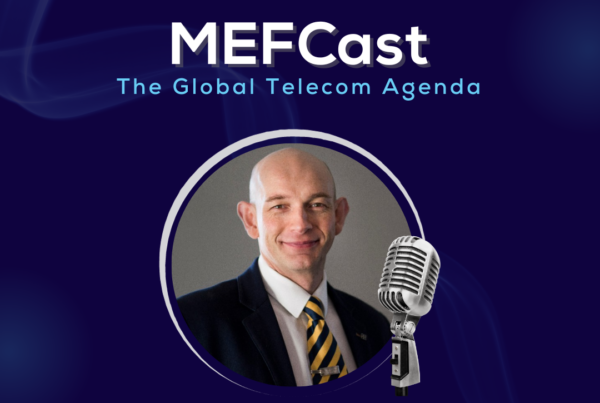The major discussion across Internet players today is about the future model to collect, manage and monetise personal data. MEF CEO Dario Betti calls for businesses to help define the opportunities at the heart of the next crucial phase of the Internet’s development.
We are witnessing a fundamental review and restructuring of internet business models
Much of the early Internet experience was based on advertising revenues, often relying on companies collecting data without clear consent from users and sharing it with a large number of advertisers and intermediaries to provide ‘better profiling’ of customers.

Targeted online advertising has not always collected personal data securely or transparently. The last Consumer Trust Report from MEF described how 2018 saw the majority of smartphone users worried about their personal data and showed how this is starting to shape behaviour to limit exposure.
It is not just consumers that are reacting to the personal data debate. Google, Facebook, Apple, Microsoft are joining in chorus the call for “re-plumbing the whole infrastructure” to use the words of Facebook’s CEO Mark Zuckerberg himself. Zuckerberg has promised, after the data scandals of 2018, to re-build Facebook as a “privacy-focused social platform”; you could hear him saying “The Future is private” to Facebook developers in May 2018.
“Privacy cannot be a luxury good offered only to people who can afford to buy premium products and services” wrote Sundar Pichai, CEO Google, in an opinion piece for the New York Times in May 2019. In the piece Pindar goes further calling the USA to adopt GDPR regulation: “Europe raised the bar for privacy laws around the world when it enacted the General Data Protection Regulation. We think the United States would benefit from adopting its own comprehensive privacy legislation and have urged Congress to pass a federal law.”
The two biggest advertising companies in the word are now supporting a massive review of their own markets. But these are actually only the latest of the Silicon Valley comments.
In January, at the World Economic Forum in Davos, the CEO of Microsoft, Satya Nadella was saying “My own point of view on GDPR is it’s a fantastic start on really treating privacy as a human right”.
These were kinder words than the one used by the CEO of Apple in his opinion piece in Time Magazine just a few days earlier. Cook railed against the “shadow economy” of firms profiting from people’s personal data – a poke at the data brokers industry that collect and sells personal data in the Internet. Cook goes on to suggest four principles:
MEF has long championed the need to put the consumer at the centre of this flow of information, allowing the exchange of even more data, but with the clear and conscious consent from the users. A new model of data is possible, and members of our Personal Data Workgroup are working to describe this transformation.””
“First, the right to have personal data minimized. Companies should challenge themselves to strip identifying information from customer data or avoid collecting it in the first place. Second, the right to knowledge—to know what data is being collected and why. Third, the right to access. Companies should make it easy for you to access, correct and delete your personal data. And fourth, the right to data security, without which trust is impossible.”
MEF has long championed the need to put the consumer at the centre of this flow of information, allowing the exchange of even more data, but with the clear and conscious consent from the users. A new model of data is possible, and members of our Personal Data Workgroup are working to describe this transformation.
Targeted advertising will still exist but a new model that will let the user feel respected, informed and even rewarded in some instances for sharing personal data. Fundamentally, users will be able to control their data: giving clear permission (and revoking it) to companies, accessing information stored about them, and editing and deleting data at will.
The CEOs of the largest and most influential companies in the world do not write opinion pieces, talk to their developer community, or give speeches at Davos by chance. The last 6 months have seen clear changes in the attitudes towards personal data, with greater importance given to the transparency of data control. The big Internet companies are changing, so the Internet is changing, but is your company changing too? It probably should pause and consider the consequences. MEF has long been at the forefront of the Personal Data Debate, to stay abreast and to contribute to the debate join the largest network of personal data and identity companies: learn, influence and impact.
Digital Identity – without it nothing is ‘personal’
If you have come to agree that the question of personal data is key to the future of the Internet, you would quickly come to the conclusion than that you also need a better structure for identity in the digital world. There cannot be any ‘personal’ data if everybody can claim it. Creating a private world, also means creating an identity that users can claim online. Digital Identity is now fully established as one of the most significant global technology issues facing the industry.
Several national identity programmes have been announced in the last 5 years, and we now have seen 28 countries adopting the electronic ID initiatives. 2018 has been a leap forward in the quality of the projects, even if they often remained fragmented and limited in their applications. Companies are also looking at establishing identities services separately from the state ID solutions: technologies are now making leaps and new standards are emerging. But the common thread that links all of these is the central role that the Mobile device (in its multiple forms) would potentially assume.
As the Mobile First countries emerge, millions of people in the developing world are getting connected to the internet without even owing a PC, a trend that is now becoming more common among younger generations of millennials in the West. Mobile is set to play a major role in the portable electronic ID.
At MEF, we monitor the development of Identity Solutions across the globe and foster for a global approach to a mobile enabled ID solution.
Compliance to Personal Data Security – the new challenge
The often mentioned GDPR is going to have a much deeper and wider reach than originally planned. MEF has been leading the education and the understanding of the implications of GDPR on mobile and the telecoms world at large. However, GDPR is not a specific set of regulations, of “do’s” and “don’ts”. Instead this framework establishes principles, terminologies and overall goals. Much of the hard work will still have to take place to find a common ground and to understand how to re-set companies’ approaches to personal data.
This is the goal of MEF, to continue to grow the understanding of GDPR and to move outside the early “check box” mentality that was seen in the last dash to meet the GDPR deadline in May 2018.
If your company deals with personal data in mobile, do not be surprised by the new developments. The cost of bad data implementation can be onerous. In June 2019, British Airways was fined 183 million GBP ($230 million US ) or 1.5% of its worldwide turnover for 2017 – a breach of GDPR regulation can be costly.
Register Now for the MEF Webinar – October 17
Online advertising and Personal Data – Regulatory briefing
These issues will be discussed in a MEF Webinar in the coming months – save the date now to join the debate.






